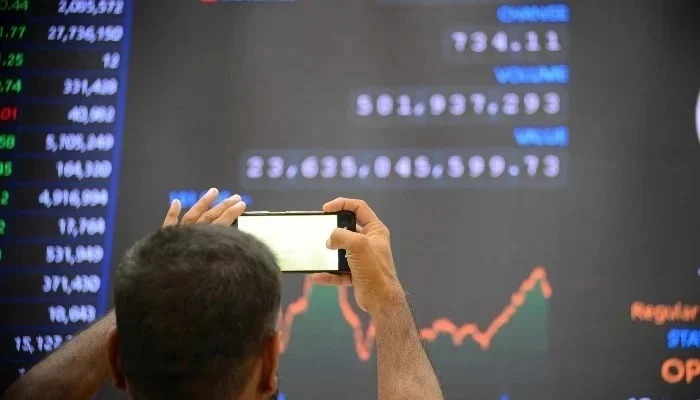
- The KSE-100 index closed at 112,638.26, marking a sharp decline.
- Overall, the index lost 1,510.19 points, or -1.32%, during the session.
- The index fell to an intraday low of 112,594.66 points.
The stock market remained under pressure Thursday as a combination of political instability, political concerns and structural challenges continued to weigh on investor confidence.
These challenges, coupled with ongoing tensions in the energy sector, contributed to mixed trading activity.
The Pakistan Stock Exchange (PSX) benchmark KSE-100 index ended the session at 112,638.26, marking a loss of 1,510.19 points, or -1.32 percent, from the previous close of 114,148.45.
The market touched an intraday high of 114,329.95 points but declined sharply to a low of 112,594.66 points.
“Pressure was seen at PSX amid concerns over investors being barred from under-reporting under the new tax changes,” said Ahsan Mehanti, managing director and CEO of Arif Habib Commodities .
He added: “Political uncertainty, concerns over cautious easing of SBP policy and uncertainty over the outcome of slippages in IMF tax collection and structural reform targets have played a role in catalyst in bearish activity. »
The recently introduced Taxation (Amendment) Act, 2024, which prohibits non-filers from opening accounts in the stock exchanges, has drawn sharp criticism from stakeholders. The Pakistan Stock Brokers’ Association (PSBA) has expressed serious concerns, calling for urgent dialogue with government officials.
The controversial amendment states: “…any person authorized to sell securities, including debt securities or units of mutual funds, shall not sell, open an account or authorize the sale of securities or mutual funds of placement to an ineligible natural person or association of persons. »
This rule directly affects non-filers, many of whom make up a significant portion of active traders in the stock market. The PSBA warned that the move could significantly reduce participation in the stock market and dampen investor confidence.
Adding to the fiscal challenges, last month, Federal Board of Revenue (FBR) Chairman Rashid Mahmood Langrial revealed that the country’s tax gap stood at Rs 7.1 trillion, the income tax gap alone representing 2,400 billion rupees. This revelation highlights Pakistan’s difficulty in meeting tax collection targets linked to the IMF program.
Market volatility was exacerbated by profit-taking by large institutional investors such as insurance companies and banks, which was not offset by adequate new purchases by mutual funds.
“In recent sessions, we have seen profit-taking by large institutional investors, such as insurance companies and banks, without adequate further buying by mutual funds,” he said. said Muhammad Saad Ali, Director of Research at Intermarket Securities Ltd.
He added: “The market is lacking new positive triggers at the moment, after a strong rally, and political concerns are growing. I suspect the same theme is playing out today.”
Prime Minister Shehbaz Sharif, during his visit to Karachi on Wednesday, sought to restore optimism, reiterating his confidence in the economy’s path to recovery. Speaking at PSX, the Prime Minister acknowledged that current tax rates were hampering trade and investment activities.
However, he stressed the importance of honoring commitments made under the IMF program, recognizing its role in ensuring economic stability.
Adding to this narrative, Deputy Prime Minister Ishaq Dar highlighted the long-term benefits of stock market integration, saying it had become a strong foundation for the economy.
Finance Minister Muhammad Aurangzeb also highlighted the critical role of the stock market in boosting investor confidence and boosting economic growth.
Exacerbating the economic strain, the diversion of regasified liquefied natural gas (RLNG) to the domestic sector jumped to 450 million cubic feet per day in January 2025, from 250 million cubic feet per day in December 2024. This increase, under the jurisdiction of Sui Northern Gas Pipelines Limited, is expected to worsen. circular debt in the gas sector.
The gap between the domestic tariff of Rs 1,250 per MMBTU and the RLNG tariff of Rs 3,600 per MMBTU adds substantial financial pressure to gas utilities, raising concerns over the sustainability of the sector.
The IMF’s proposed levy on gas supplies to industrial captive power plants (CPPs) remains a key structural benchmark under the Extended Fund Facility (EFF), further heightening investors’ concerns over compliance and financial difficulties.
On the fiscal front, the government on Wednesday raised 434 billion rupees through the auction of treasury bills from the market, exceeding the target of 250 billion rupees but short of the maturity amount of 654 billion rupees.
The decline in yield limits on three-month, six-month and 12-month securities – by 22 basis points, 21 basis points and 50 basis points, respectively – indicates that the market is anticipating further monetary easing from the the State Bank of Pakistan (SBP).
Expectations of a rate cut were reinforced by falling inflation, which fell to 4.1% year-on-year in December from 4.9% in November.
This trend, fueled by a stable currency, falling global commodity prices and improving supply chain conditions, has sparked some optimism among policymakers and investors.
The KSE-100 index closed at 116,052.68 on Wednesday, a loss of 202.44 points, or -0.17%, as profit-taking and lingering concerns over the circular debt sector energy kept the market in the red for the third consecutive day.
